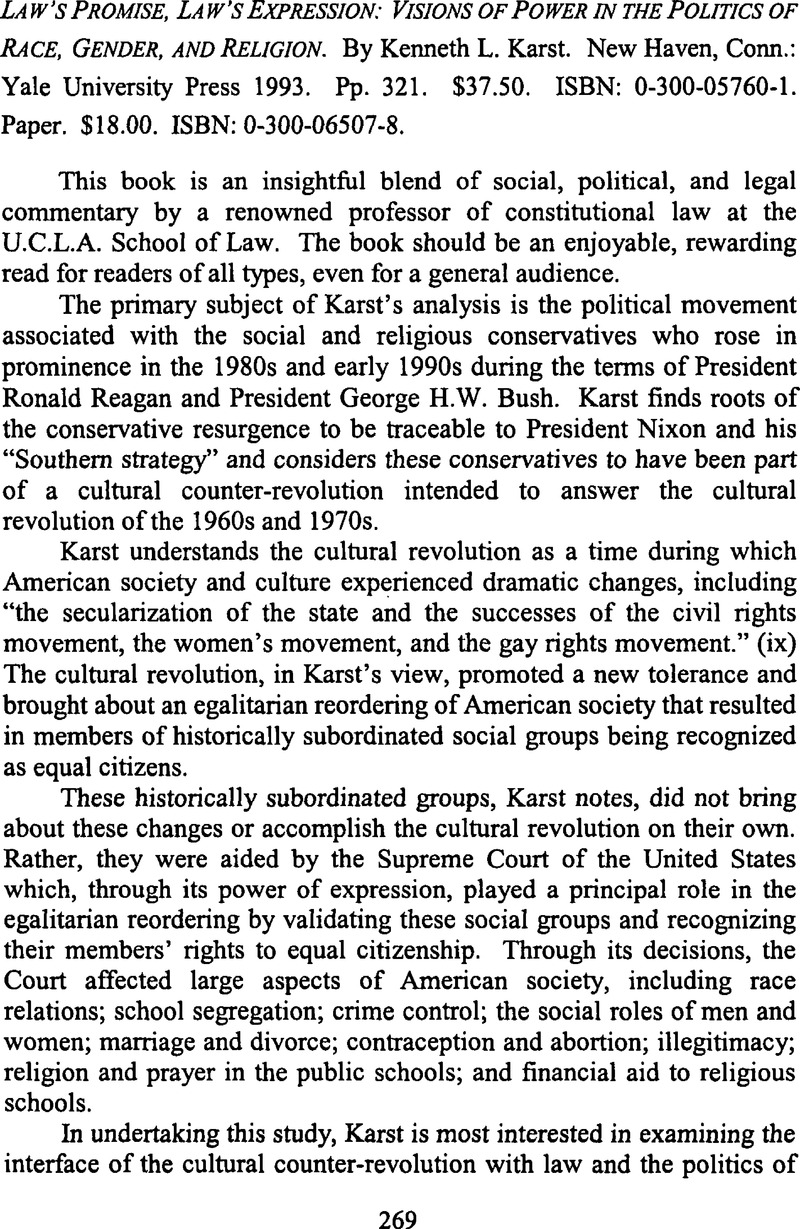No CrossRef data available.
Article contents
Law's Promise, Law's Expression: Visions of Power in the Politics of Race, Gender, and Religion. By Kenneth L. Karst. New Haven, Conn.: Yale University Press1993. Pp. 321. $37.50. ISBN: 0-300-05760-1. Paper. $18.00. ISBN: 0-300-06507-8.
Published online by Cambridge University Press: 24 April 2015
Abstract

- Type
- Review Essays and Reviews
- Information
- Copyright
- Copyright © Center for the Study of Law and Religion at Emory University 2000
References
1. See e.g. Karst, Kenneth L., Local Discourse and the Social Issues, 12 Cardozo Stud. L. & Literature 1 (2000)CrossRefGoogle Scholar; Citizenship, Law, and the American Nation, 7 Ind. J. Global Legal Stud. 595 (2000)Google Scholar; Myths of Identity: Individual and Group Portraits of Race and Sexual Orientation, 43 UCLA L. Rev. 263 (1995)Google Scholar; Religious Freedom and Equal Citizenship: Reflections on Lukumi, 69 Tul. L. Rev. 335 (1994)Google Scholar; Belonging to America: Equal Citizenship and the Constitution (Yale U. Press 1989)Google Scholar; Why Equality Matters, 17 Ga. L. Rev. 245 (1983)Google Scholar; Equality and Community: Lessons from the Civil Rights Era, 56 Notre Dame Law 183 (1980)Google Scholar; The Supreme Court, 1976 Term-Foreword: Equal Citizenship Under the Fourteenth Amendment, 91 Harv. L. Rev. 1 (1977)Google Scholar; Equality as a Central Principle in the First Amendment, 43 U. Chi. L. Rev. 20 (1975)CrossRefGoogle Scholar.
2. See Karst's much acclaimed Belonging to America, supra, n. 1.
3. For Karst, the psychological and sociological roots of the social issues agenda are found in the ideology of masculinity, the anxieties of manhood, and expressions of control and dominance; and all aspects of the agenda—from the politics of motherhood and sexual orientation to those of race and crime—speak to the anxieties of manhood. See Section entitled “A Deferred Prologue: The Anxieties of Manhood and the Expression of Power” (pp. 31-37).
4. See e.g. Smith, Christian, Christian America? What Evangelicals Really Want 194 (U. Cal. Press 2000)Google Scholar.
5. Id. at 48.
6. Id. at 225.
7. Id. at 91.




